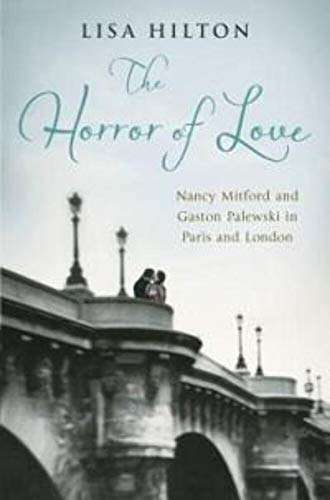
The Horror of Love: Nancy Mitford and Gaston Palewski in Paris and London
Check my rate
| Main centres: | 1-3 business days |
| Regional areas: | 3-4 business days |
| Remote areas: | 3-5 business days |

| Main centres: | 1-3 business days |
| Regional areas: | 3-4 business days |
| Remote areas: | 3-5 business days |
Published by Weidenfeld & Nicolson, 2011, hardcover, illustrated, index, 290 pages, condition: as new.
Nancy Mitford was a 37-year-old author and an inveterate master of the tease when she met her match in Free French commander Gaston Palewski at a party in London. It was 1942, the war raged on, and their initial encounter seemed like a coup de foudreor, as the heroine of the wildly popular novel he inspired, The Pursuit of Love, explains, She was filled with a wild, strange, unfamiliar happiness, and knew that this was love. Mitfords mutually influential 30-year relationship with the Colonel, as she dubbed Charles de Gaulles charismatic right-hand man, is the subject of historian Lisa Hiltons piquant latest, The Horror of Love: Nancy Mitford and Gaston Palewski in Paris and London (Pegasus). Following Palewski to Paris, where he embarked on a distinguished political career (and an ambitious private life), Mitford, armed with a spiky intellect and an elegant Dior wardrobe, made her home amid the citys gratin. As allergic to sentimentality as Palewski was to monogamy, Mitford maintained a determined shop-front dedicated to the civilized vision of romance expressed in her novels, for which she was awarded the Légion dHonneur, hand-delivered to her by Palewski before her death in 1973. Via e-mail, Vogue chatted with Hilton about why Mitfords work deserves fresh attentionand what women of her time might have to teach us about love.
I came to Nancy very much as a reader rather than a biographer. I think Nancys later novels have much in common with those of Jane Austendeceptively elegant and witty, with a strain of toughness, even darkness, beneath the surface that makes them superlative works of art. As I read biographical material, I began to feel that Nancys reputation was unfair, that she was not only a serious and substantial writer but that she was also a woman who managed a difficult relationship in an intriguing and impressive manner. When the series Sex and the City came out, I loathed it. I felt that my generation of women had been infantilized by a very old-fashioned version of love, where an essentially conventional idea of happy ever after masqueraded as liberation. So I began to explore the relationships and mores of Nancys generation and discovered a way of thinking about love and how women might live that was instinctively more appealing to me.
Nancys biographers have generally cast her love for Gaston in a pitying light; he had many other paramours, and he ultimately married another, far wealthier, woman. But you argue that it can be reductive to judge affairs of the past by contemporary mores. What challenges are involved in writing about an historical relationship? I had to be careful not to idealize Nancys relationship with Palewski, yet at the same time to respect and understand it on its own terms. A powerful influence was the Second World War: After what Nancys generation had been through, there was a sense that magnifying ones emotional troubles was self-indulgent, and that excessive earnestness was rather bad form. That doesnt mean that Nancy didnt sufferher letters reveal that she did, terriblybut that she made a conscious choice not to allow the inadequacies of her relationship to dominate her life. Looking over her letters to Gaston over thirty years, its clear that they built a mutually supportive relationship, based on genuine love. Above all, they had fun. The letters almost to the end are full of chat and gossip and jokesone has the sense that here were two people who really liked one another. And the tenderness displayed by Gaston in Nancys last years, as well as his regrets after her death from cancer, made a very poignant coda.